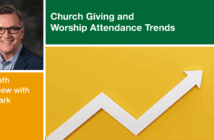Too often, pastors discuss money with their parishioners in ways that suggest that stewardship is only about donating money to support the church. Faithful stewardship, of course, involves much more than what we give to the church. It is about how we care for everything God has entrusted to us. It is about how we live in right relationship with money and possessions.
When stewardship conversations involve nothing more than the needs of a religious institution, the needs of the institution are placed ahead of the pastoral care needs of the parishioner.
Yet church members are often reluctant to address these larger challenges with their pastors because they have been conditioned over the years to believe that the pastor’s response will be one they have already heard — how the pastor can get them to provide more financial support to the church. When stewardship conversations involve nothing more than the needs of a religious institution, the needs of the institution are placed ahead of the pastoral care needs of the parishioner. It suggests that the church’s financial situation has priority over the needs of one’s family or the community at large.
If parishioners constantly hear that the church comes first when it comes to finances, they will assume that the pastor’s fiduciary responsibility to the church overrides the pastor’s concern for their overall welfare and spiritual health. They imagine that the pastor will not be sensitive to their fear of poverty in old age, to the wrangling of family members in the transition of wealth, and to the obligations one feels to the community at large. How could a pastor hear these concerns when it appears that he or she is concerned only with meeting the budget or wrapping up the current capital campaign?
How might we approach stewardship conversations differently — particularly in dealing with the affluent? A good starting point is to embrace a larger perspective on stewardship. Stewardship is about the management and accountability of resources. Stewardship involves making the best decision among many alternatives to enhance the impact of one’s resources. Responsible stewardship might well begin with taking care of one’s self so as not to become a financial burden on others in later life. Typically, people are more willing to be generous when they have some reasonable assurance that they have sufficient resources to meet their needs for the remainder of their lives.
Pastors can begin this transition by acknowledging their own vulnerabilities and missteps. Most are deeply passionate about truly helping people in need and providing spiritual resources to meet life’s greatest challenges. Yet, the pressure to keep the church alive financially can narrow the way they present financial stewardship. How refreshing might it be to laity to hear the pastor confess: “I have been making stewardship and support of the mission of the church the automatic answer to all things concerning wealth.”
Clergy also might ask for help. It can be as simple as the clergyperson privately asking one who is affluent, “What can you teach me about your needs? What are the special burdens you carry? What am I saying or doing that turns you away before we can begin a dialogue?”
First, church members can gently point out when stewardship is being presented as about the church and donor rather than a wider scope of concerns. This is probably done most effectively over coffee or tea in a private setting. A parishioner’s frankness, expressed in kindness and concern, can be a great help to the clergyperson who truly wants to be effective in ministry.
Second, church members who want to discuss their resources might clarify the help they seek. They might say, for example, “I am looking for someone who is willing to understand all of the dynamics at stake with my resources and can offer me spiritual insight into those dynamics, not just about what I give to the church.” It is fair to ask to be heard in the context of your concern, not the context of the concern of the church.
Related Resources:
- New Books on Preaching and Money by Ann A. Michel
- From Fund-raising to Stewardship by Janet and Philip Jamieson






